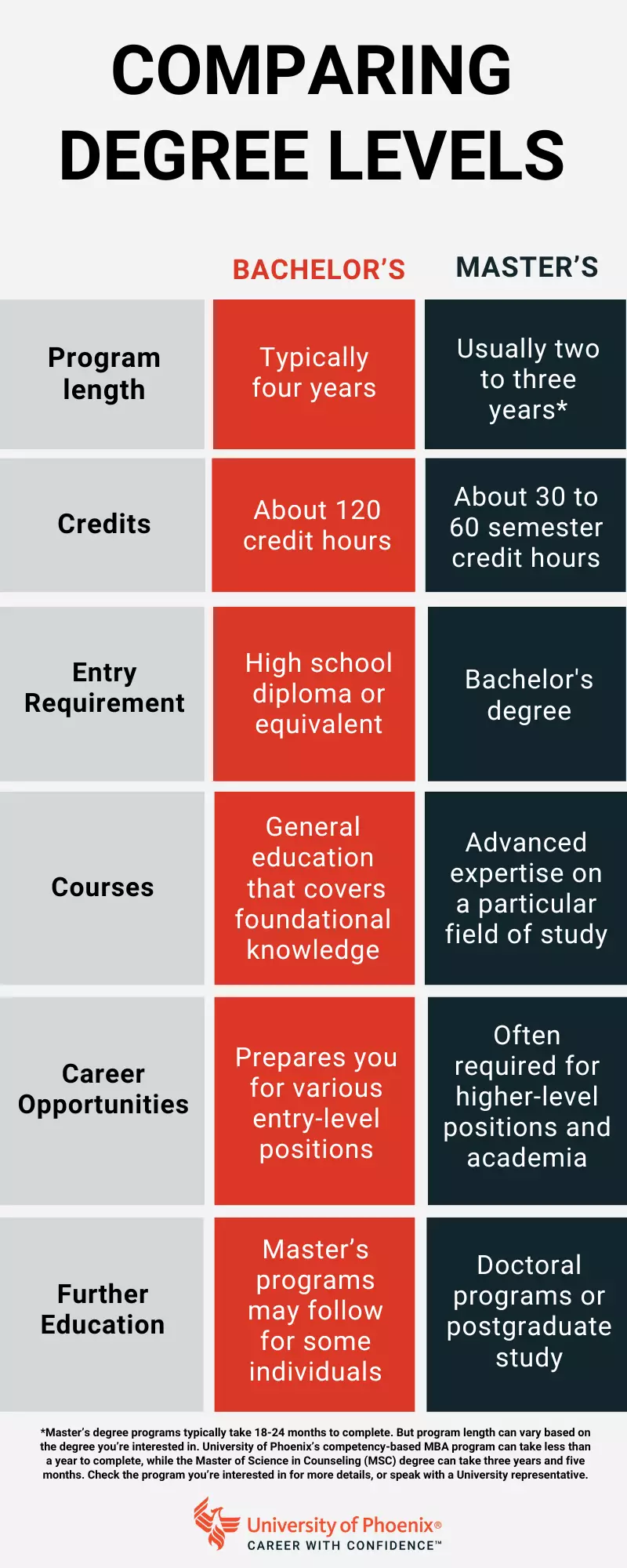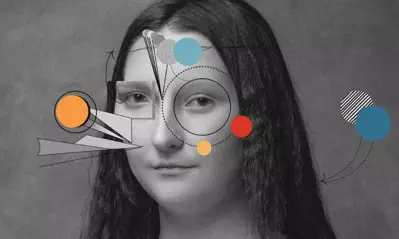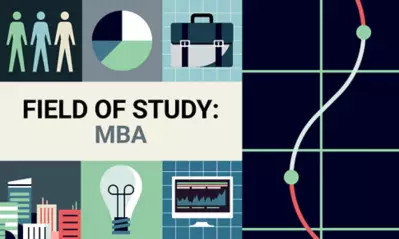Key differences between Bachelor's vs. Master's degrees

This article has been vetted by University of Phoenix's editorial advisory committee.
Read more about our editorial process.

Reviewed by Marc Booker, PhD, Vice Provost, Strategy
At a glance
- A bachelor’s degree is usually a four-year program of study completed at a college or university. Students generally complete about 120 credits of academic study.
- A master’s degree is an advanced graduate degree that can be pursued after you have completed a bachelor’s degree. Earning a master’s degree helps establish your expertise in your field and can lead to more advanced leadership positions.
- One in three American adults has a bachelor’s degree, according to the 2015 census.
- University of Phoenix offers bachelor’s and master’s degrees in a variety of subjects. Discover the one that’s right for you and your career goals!
Most people are familiar with a bachelor’s degree — often the entry point into a college education. It’s perhaps the most ubiquitous level of college educational attainment among the four types of degrees a person can earn:
- associate degree
- bachelor’s degree
- master’s degree
- doctorate
For many people, a bachelor’s degree is a stepping stone from high school to being prepared to enter the workforce. A bachelor’s degree can equip people with the necessary education and skills for various industries and signal to employers that a person is qualified for a position and has committed the time and discipline needed for the job. According to a 2018 Gallup poll on higher education, the No. 1 reason Americans pursue higher education is to get a better job or a new job altogether.
A master’s degree follows a bachelor’s degree and is a means to furthering one’s knowledge and skills and demonstrates a mastery of a professional practice. This degree may be required for employment in specific industries — like research or teaching — and may help demonstrate leadership abilities to employers.
These degree paths may seem linear, but it’s not always cut and dry. Some people pursue a second bachelor’s degree, while others may feel that a master’s is necessary for their personal and career goals. For example, suppose you’re entering a profession that requires a certain level of education, trying to earn a promotion or starting a new job. In those cases, it’s important to understand the difference between a bachelor’s and a master’s degree.
Whether you’re dreaming of a new career or you’re hoping to expand your knowledge and expertise with college degrees, knowing the difference between a bachelor’s and a master’s degree can help you achieve your goals.
Learn more about online master's degrees at University of Phoenix.
What is a bachelor's degree?
A bachelor’s degree is often a four-year program of study in which students develop skills and understanding of their program of choice at a college or university, online or in person. Students typically complete a bachelor’s degree immediately after high school, but it’s common for adults to complete their degree later in life.
A bachelor’s covers the core educational elements of an area of study — known as general education — that gives you working knowledge of a wide variety of topics before you take courses focused on the major or specialty in which you want to focus. Students can also expect to take elective credits to help expand their knowledge in the field or a similar area of interest. These courses may consist of lectures, exams and hands-on experiments.
Bachelor’s degree programs can be in the sciences or the arts and may include academic areas like business, nursing, computer science, psychology or English. During their program, students can expect to generally complete about 120 credits of study.
Many students take a general education they achieve at one institution, often a community college, and then transfer those credits to a different institution to complete their degree. This process can help save money in the long run.
Students often pursue a bachelor’s degree to help enhance their career opportunities. In 2021, nearly 38% of the U.S. population had a bachelor’s degree, according to the U.S. Census Bureau. In addition, over the past several decades, a bachelor’s has become a requirement by employers for consideration for many jobs. A bachelor’s degree is one of the most commonly required degrees for employment, according to the U.S. Bureau of Labor Statistics.
How to earn a bachelor's degree
Earning a bachelor’s degree can be done in various ways. Students used to earn these degrees exclusively through in-person courses. However, online programs have grown in popularity.
To earn a bachelor’s degree, start by choosing a school and filling out an application. Consider whether you want in-person or remote learning, what subject matter you want to major in, and the cost of attending the school. If you’re uncertain about your major, you can speak with prospective schools, your employer, your family or professionals in the field you’re considering.
Once a school grants you admission, you’ll complete your undergraduate degree requirements (a mix of general education classes and classes within your major) and work toward graduation. Degree requirements depend on your major.
What types of bachelor's degree programs are there?
Bachelor of Arts (BA)
One of the most common bachelor’s degrees, a Bachelor of Arts generally focuses on a discipline of the arts or humanities. This type of degree program is centered more on each student’s individual exploration of a given subject. BA students tend to have more leeway when it comes to planning and completing their studies compared to the stricter requirements that are usual for a BS or BFA.
Bachelor of Science (BS)
A Bachelor of Science, or BS, degree tends to focus more on science and math compared to a BA or MFA. The focus of study generally remains on the specific subjects related to the degree. There is much less focus on the exploration of other subjects compared to a BA or MFA program.
Bachelor of Fine Arts (BFA)
A BFA is very similar to a BA degree but generally focuses on the arts, specifically the performing arts, visual arts and music. These programs tend to emphasize hands-on learning in a studio setting. The lectures and exams that are common in BA and BS programs are less common in BFA programs.
Bachelor's degree programs
Within almost every professional field, a variety of bachelor’s degree programs can expand your expertise and prepare you for success. Understanding the difference between degree programs can help you plot the next steps of your educational journey. Some examples of bachelor’s degree programs are:
- Bachelor of Arts in English: This degree prepares you to communicate effectively and creatively with others. This can be as a writer, editor, teacher or many more creative professions.
- Bachelor of Science in Business: This degree prepares you to work in the world of business and offers a wide variety of ways to specialize further. You can earn certification in marketing, project management, finance, human resource management and more.
- Bachelor of Science in Cybersecurity: Learning to protect others against technological threats is an amazing choice of career. By pursuing this degree, you’re setting yourself up for success through a wide range of classes, including risk assessment and ethical hacking.
- Bachelor of Science in Environmental Science: Climate change, which is long-term shifts in temperature and weather patterns, is affecting our planet. With a degree in environmental science, you can work at the forefront of this field to propose positive, environmentally friendly changes.
- Bachelor of Science in Nursing (BSN): With the onset of the COVID-19 pandemic, nursing was highlighted as an increasingly vital part of our society. If you’re interested in pursuing a career in medicine and helping others, then earning your nursing degree might be the choice for you.
Possible career paths with a bachelor's degree
Earning a bachelor’s degree can open up new and exciting professional opportunities. These opportunities include careers such as:
- Registered nurse
- Medical and health services manager
- Marketing manager
- Information security analyst
- Software developer
By earning a degree, you’re showing future employers you’re committed to furthering your education and your expertise.
What can I do after a bachelor's degree?
For many, jumping right into an entry-level career aligned with their undergraduate education is perfect. That being said, there are more options out there that are worth considering. It can take time to figure out exactly what to do with an education.
Make sure to research the education requirements for your career of choice to go into your college experience with a plan. If you need further assistance on how to enter the workforce after you’ve earned a bachelor’s degree, consider talking with a career coach or the alumni department at your university.
There can be a lot of pressure to enter the workforce after completing an academic degree. However, that isn’t the best for everyone. Thinking about and deciding on a path toward personal goals can help prepare students for a fulfilling life long after graduation.
Of course, there’s also the option to pursue further education, either in the form of another bachelor’s degree or a master’s degree.
What is a master's degree?
A master’s degree is an advanced graduate degree that can be pursued after you have completed the bachelor’s degree requirement. Earning a master’s degree helps establish your expertise in your field and can help prepare graduates to take on more responsibility and pursue leadership positions.
A master’s degree tends to be much more rigorous than a bachelor's degree program and requires a more specialized focus of study. A master’s degree generally takes less time than a bachelor’s degree (usually about two or three years) and takes about 30 to 60 semester credits to complete.
People pursue master’s degrees for a variety of reasons. Some students are looking to increase their chances of employment or seek more job security. Others are switching careers. Additionally, earning a master’s gives you more opportunities to conduct research and contribute to your chosen field.
There are three types of master’s degrees, which align very similarly with the kinds of bachelor’s degrees:
- Master of Arts (MA)
- Master of Science (MS)
- Master of Fine Arts (MFA)
How to earn a master's degree
Though the specifics depend on the specific master’s degree program, there are various prerequisites generally required of most graduate degree programs:
- A high school or GED® diploma
- A bachelor’s degree in a field related to the master’s degree program
- A transcript listing the classes attended and grades achieved during the bachelor’s program.
- A letter of recommendation
Unlike bachelor’s degrees, master’s degrees don’t require general education courses. Instead, your coursework will likely focus on your specialized field of study.
Master's degree programs
Master’s degree programs are meant to prepare you for a higher level within your career. Some examples of master’s degrees are:
- Master of Science in Counseling: Working in the mental health field requires higher education and knowledge. Earning your master’s degree qualifies you to help people who are struggling with clinical mental health disorders.
- Master of Science in Administration of Justice and Security: This degree prepares you to work in a leadership role within the criminal justice system. This can include careers such as police chief or chief deputy.
- Master of Public Administration: An MPA prepares you for government or nonprofit operations careers. This includes roles such as city manager and nonprofit director.
- Master of Health Administration: If you’re interested in the business side of hospital operations, then a Master of Health Administration degree will give you the specialized tools you need to succeed in this field.
- Master of Arts in Education/Adult Education and Training: This master’s program tailors to cultivating the skills needed to thrive in the field of distance learning and training. You’ll be prepared to direct distance learning programs for schools and professional organizations.
Unlike a bachelor’s degree, which involves a broader level of study, a master’s degree requires you to dive deeper into your chosen subject and develop a higher level of expertise by the time you graduate.
Possible career paths with a master's degree
Careers that require a master’s degree are often at a higher level of leadership or scholarship. A master’s education can signal competency and commitment to an employer and may be a requirement for consideration for employment. Some examples of jobs that often require a master’s degree are:
- Nurse practitioner
- Information systems director
- Mental health counselor
- Adjunct professor
- Postgraduate researcher
- City manager
An advanced academic degree can help you reach specific career goals, earn a promotion or move to a new role at a different company. Your degree depends on your career goals and the educational requirements to achieve them. For some, a master’s degree may not end their academic journey. Graduates can take their advanced degrees further into doctoral programs and postgraduate study.
If you’re looking to pursue a bachelor’s or master’s degree, University of Phoenix (UOPX) can help. From education to business, your degree can take you in a number of directions. Learn more about degree programs from UOPX and discover the one that’s right for you!

ABOUT THE AUTHOR
A graduate of Johns Hopkins University and its Writing Seminars program and winner of the Stephen A. Dixon Literary Prize, Michael Feder brings an eye for detail and a passion for research to every article he writes. His academic and professional background includes experience in marketing, content development, script writing and SEO. Today, he works as a multimedia specialist at University of Phoenix where he covers a variety of topics ranging from healthcare to IT.



